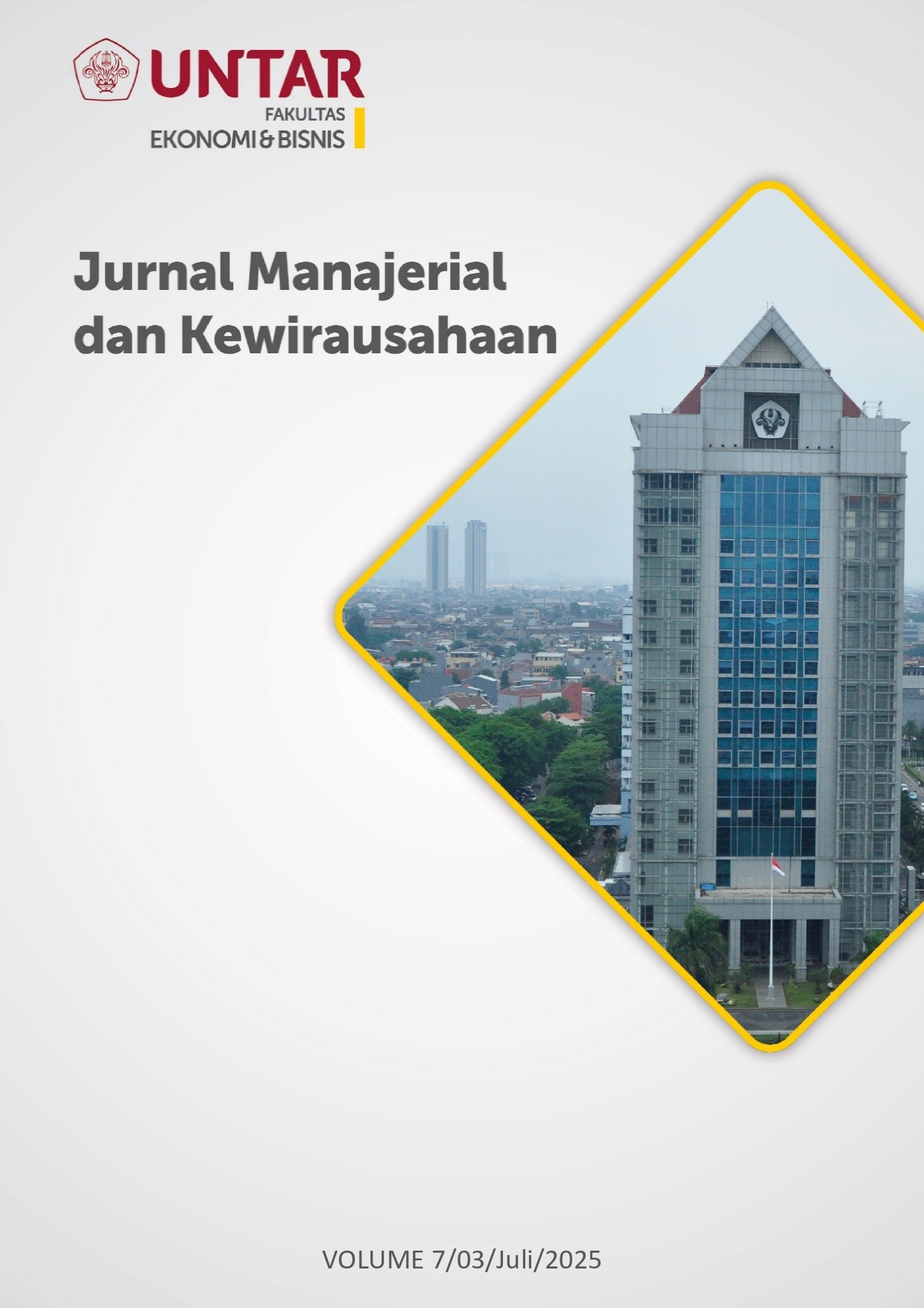Pengaruh Kreativitas dan Pendidikan Kewirausahaan terhadap Niat Berwirausaha Melalui Efikasi Diri pada Mahasiswa Universitas Tarumanagara
Main Article Content
Abstract
Berdasarkan survei di Indonesia, tingkat pengangguran di negara ini tergolong tinggi dan perlu diatasi. Salah satu cara untuk mengatasinya yakni dengan menciptakan sebuah usaha, dimana hal ini secara tidak langsung akan membuka banyak lapangan pekerjaan. Terdapat banyak pihak yang dapat mempelopori berdirinya sebuah usaha, salah satunya mahasiswa. Oleh karena itu, tujuan penelitian ini adalah untuk menguji pengaruh unsur kepribadian yakni kreativitas, pendidikan kewirausahaan, dan efikasi diri terhadap niat berwirausaha mahasiswa Fakultas Ekonomi dan Bisnis Universitas Tarumanagara. Sampel dipilih sebanyak 137 mahasiswa yang terdiri dari jurusan manajemen dan akuntansi. Pengolahan data dalam penelitian ini menggunakan program SmartPLS4. Hasil penelitian menunjukkan bahwa kreativitas, pendidikan kewirausahaan dan efikasi diri memiliki pengaruh yang positif dan signifikan terhadap niat berwirausaha mahasiswa/mahasiswi Fakultas Ekonomi dan Bisnis Universitas Tarumanagara.
Based on a survey in Indonesia, the unemployment rate in this country is relatively high and needs to be addressed. One way to overcome this is by creating a business, which will indirectly open up many jobs. There are many parties who can pioneer the establishment of a business, one of which is students. Therefore, the purpose of this study is to test the influence of personality elements, namely creativity, entrepreneurship education, and self-efficacy on the entrepreneurial intentions of students of the Faculty of Economics and Business, Tarumanagara University. A sample of 137 students was selected consisting of management and accounting majors. Data processing in this study used the SmartPLS4 program. This study showed that creativity, entrepreneurship education and self-efficacy had a positive and significant influence on the entrepreneurial intentions of students of the Faculty of Economics and Business, Tarumanagara University.
Article Details
Section

This work is licensed under a Creative Commons Attribution-NonCommercial-ShareAlike 4.0 International License.
This work is licensed under a Jurnal Muara Ilmu Ekonomi dan Bisnis Creative Commons Attribution-ShareAlike 4.0 International License.,/p>
References
Abbasianchavari, A., & Moritz, A. (2021). The impact of role models on entrepreneurial intentions and behavior: a review of the literature. Management Review Quarterly, 71(1), 1–40. https://doi.org/10.1007/s11301-019-00179-0
Ajzen, I. (1991). The theory of planned behavior. Organizational Behavior and Human Decision Processes, 50(2), 179–211. https://doi.org/10.1016/0749-5978(91)90020-T
Ajzen, I. (2008). Consumer attitudes and behavior. Dalam Handbook of Consumer Psychology, 525-548. Lawrence Erlbaum Associates.
Astiana, M., Malinda, M., Nurbasari, A., & Margaretha, M. (2022). Entrepreneurship Education Increases Entrepreneurial Intention among Undergraduate Students. European Journal of Educational Research, 11(2), 995–1008. https://doi.org/10.12973/eu-jer.11.2.995
Ben Youssef, A., Boubaker, S., Dedaj, B., & Carabregu-Vokshi, M. (2021). Digitalization of the economy and entrepreneurship intention. Technological Forecasting and Social Change, 164, 120043. https://doi.org/10.1016/J.TECHFORE.2020.120043
del Brío González, J. Á., Mitre Aranda, M., & Barba-Sánchez, V. (2022). Environmental awareness and the entrepreneurial intention in university students: Direct and mediating effects. International Journal of Management Education, 20(3). https://doi.org/10.1016/j.ijme.2022.100719
Elen, M., Rusno, R., & Yudiono, U. (2018). Pengaruh Kreativitas Berwirausaha, Prestasi Belajar Dan Efikasi Diri Terhadap Minat Berwirausaha Mahasiswa. Jurnal Riset Pendidikan Ekonomi, 3(1). https://doi.org/10.21067/JRPE.V3I1.3813
Hair, J. F., Ringle, C. M., & Sarstedt, M. (2011). PLS-SEM: Indeed a silver bullet. Journal of Marketing Theory and Practice, 19(2), 139–152. https://doi.org/10.2753/MTP1069-6679190202
Hair, J. F., Risher, J. J., Sarstedt, M., & Ringle, C. M. (2019). When to use and how to report the results of PLS-SEM. In European Business Review (Vol. 31, Issue 1, pp. 2–24). https://doi.org/10.1108/EBR-11-2018-0203
Hang, C. C., & Chen, J. (2021). Innovation management research in the context of developing countries: Analyzing the disruptive innovation framework. International Journal of Innovation Studies, 5(4), 145–147. https://doi.org/10.1016/J.IJIS.2021.09.001
Hasanah, F. A., & Rafsanjani, M. A. (2021). Pengaruh Efikasi Diri Terhadap Intensi Berwirausaha Mahasiswa Pendidikan Ekonomi Dengan Kreativitas Sebagai Variabel Mediator. Jurnal Pendidikan Ekonomi Dan Kewirausahaan, 5(1), 162–174. https://doi.org/10.29408/jpek.v5i1.3440
Hernawati, E., & Yuliniar, Y. (2019). Pemetaan Potensi dan Minat Mahasiswa UPN “Veteranˮ Jakarta untuk Berwirausaha. Ekonomi Dan Bisnis, 5(2), 145–159. https://doi.org/10.35590/jeb.v5i2.748
Junus, N. R., Ismail, Y. L., & Abdussamad, Z. K. (2023). Pengaruh Motivasi Dan Kreativitas Terhadap Minat Wirausaha Mahasiswa Di Universitas Negeri Gorontalo. Jambura, 5(3). http://ejurnal.ung.ac.id/index.php/JIMB
Li, Y., Li, B., & Lu, T. (2022). Founders’ Creativity, Business Model Innovation, and Business Growth. Frontiers in Psychology, 13. https://doi.org/10.3389/fpsyg.2022.892716
Liu, H., Kulturel-Konak, S., & Konak, A. (2020). Measuring the Effectiveness of Entrepreneurship Education. Dalam Proceedings of the Annual Hawaii International Conference on System Sciences, 4705–4714. https://doi.org/10.24251/HICSS.2020.579
Liu, Y., Li, M., Li, X., & Zeng, J. (2022). Entrepreneurship education on entrepreneurial intention: The moderating role of personality and family economic status. Frontiers in Psychology, 13. https://doi.org/10.3389/fpsyg.2022.978480
Mulyati, S. (2023). Pengaruh Pendidikan Kewirausahaan Dan Digital Literacy Terhadap Minat Berwirausaha Mahasiswa Dengan Efikasi Diri Sebagai Mediator. https://doi.org/10.26740/jupe.v11n2.p222
Nowiński, W., & Haddoud, M. Y. (2019). The role of inspiring role models in enhancing entrepreneurial intention. Journal of Business Research, 96, 183–193. https://doi.org/10.1016/j.jbusres.2018.11.005
Pratana, K., & Margunani. (2019). Pengaruh sikap berwirausaha, norma subjektif dan pendidikan kewirausahaan terhadap intensi berwirausaha. Economic Education Analysis Journal, 8(2), 533–550. https://doi.org/10.15294/eeaj.v8i2.31489
Puni, A., Anlesinya, A., & Korsorku, P. D. A. (2018). Entrepreneurial education, self-efficacy and intentions in Sub-Saharan Africa. African Journal of Economic and Management Studies, 9(4), 492–511. https://doi.org/10.1108/AJEMS-09-2017-0211
Ramadani, V., Rahman, M. M., Salamzadeh, A., Rahaman, M. S., & Abazi-Alili, H. (2022). Entrepreneurship Education and Graduates’ Entrepreneurial Intentions: Does Gender Matter? A Multi-Group Analysis using AMOS. Technological Forecasting and Social Change, 180, 121693. https://doi.org/10.1016/J.TECHFORE.2022.121693
Saoula, O., Shamim, A., Ahmad, M. J., & Abid, M. F. (2023). Do entrepreneurial self-efficacy, entrepreneurial motivation, and family support enhance entrepreneurial intention? The mediating role of entrepreneurial education. Asia Pacific Journal of Innovation and Entrepreneurship, 17(1), 20–45. https://doi.org/10.1108/apjie-06-2022-0055
Wardana, L. W., Narmaditya, B. S., Wibowo, A., Mahendra, A. M., Wibowo, N. A., Harwida, G., & Rohman, A. N. (2020). The impact of entrepreneurship education and students’ entrepreneurial mindset: the mediating role of attitude and self-efficacy. Heliyon, 6(9). https://doi.org/10.1016/j.heliyon.2020.e04922
Wirjadi, J. E., & Wijaya, A. (2023). Pengaruh efikasi diri terhadap minat berwirausaha dengan sikap dan kreativitas kewirausahaan sebagai mediasi. Jurnal Manajerial dan Kewirausahaan, 5(2), 540-548. https://doi.org/10.24912/jmk.v5i2.23425

